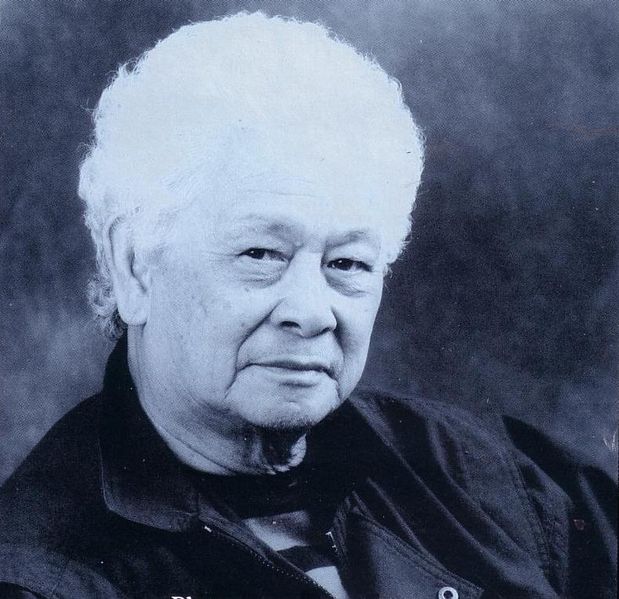- Pham Duy
Infobox musical artist
Name = Phạm Duy

Img_capt =
Img_size = 194x192px
Background = non_performing_personnel
Birth_name = Phạm Duy Cẩn
Alias =
Born = Birth date and age|1921|10|5|mf=y
Origin =Hanoi ,Vietnam
Occupation = songwriter, folk singer
Years_active = 1945-current
Label =Pham Duy ( _vi. Phạm Duy) (born
October 5 ,1921 ) is a very popular and prolific Vietnamese songwriter. He, along withVan Cao andTrinh Cong Son , is widely considered one of the three most salient figures of modern (non-classical) Vietnamese music. Pham Duy's musical career spans fifty years. He has written over one thousand songs which he divides into different periods: Folk, Heart, Spiritual, Profane, and Children's Songs.Life
He was born Phạm Duy Cẩn, on
October 5 , 1921 inHanoi . His father,Phạm Duy Tốn , was a progressive journalist and writer, and one of the earliest writers of European-style short stories. Phạm Duy Tốn was also one of the founders of theTonkin Free School movement. His older brother wasPhạm Duy Khiêm , a professor, and laterSouth Vietnam 's ambassador to France, as well as a Francophone writer.He attended Thang Long High School where his teachers included
Vo Nguyen Giap . He then attended the College of Arts and the Ky Nghe Thuc Hanh Vocational College. He taught himself music and studied in France in 1954-55 under Robert Lopez and as an unregistered student at the Institut de Musicologie in Paris.His musical career started as a singer in the Duc Huy musical troupe, performing around the country in 1943-44. He then became a musical cadre for the
Viet Minh during their resistance against the French. He left the Viet Minh after 6 years for French-controlled Hanoi and subsequently moved south to Saigon after becoming disenchanted with their censorship. [cite web|url=http://www.uky.edu/Centers/Asia/SECAAS/Seras/2005/Henry.htm|title=Phạm Duy and Modern Vietnamese History|author=Eric Henry|accessdate=2007-12-04] His work was subsequently banned in communist-controlled areas.After the
fall of Saigon , Pham Duy and his family moved to the United States where he settled inMidway City, California . His music was banned in unified Vietnam between 1975 and 2005. He continues a minstrel's life and appears regularly all over the world to sing his new refugees' songs ("tị nạn ca"), prisoners' songs ("ngục ca"), and "hoang cam" songs.He first returned to Vietnam for visits in the late 1990s and early 2000s. In 2005, he announced that he and his son, the singer Duy Quang, would return permanently. His announced return was greeted with much fanfare in Vietnam, and the government began to ease restrictions on his work. To date, dozens of his songs have been allowed to circulate in Vietnam again.
Criticisms
Pham Duy's move from the U.S., where he resided since 1975, to
Ho Chi Minh City , has been a source of much criticism, from both outside and within Vietnam. Some overseas Vietnamese see his actions as hypocritical in showing sympathy toward the Communist government of Vietnam, since a number of songs have been about resistance, refugees, and their homeland. On the other hand, some musicians from within Vietnam, particularly Hanoi, see the acclaim accorded to his return as inappropriate for someone whom they consider a traitor. [vi cite news|title=Phạm Duy vẫn gây tranh cãi (Pham Duy still stirs controversies)|url=http://www.bbc.co.uk/vietnamese/entertainment/story/2006/03/060313_phamduy.shtml|date=2006-03-13 |accessdate=2007-12-04|publisher=BBC World Service (Vietnamese)]Works
Periods
Pham Duy divides his career into several periods:
* Folk Songs (Dân Ca), which recorded the images of the Vietnamese during the struggle for independence, culminating in his Song Cycles (Truong Ca), which join several folk tunes to proclaim the greatness of the Vietnamese people.
* Heart' Songs (Tâm Ca) - which aimed to awake humanity's conscience, to protest against violence and inhumanity.
* Spiritual Songs (Đạo Ca), with a Zen character, which aimed to seek for the truth.
* Profane Songs (Tục Ca), which tackled head-on hypocritical attitudes and phony virtues.
* Children's Song (Bé Ca), Young Women's Songs (Nữ Ca) and Peace Songs (Bình Ca), which were songs of joy.
* Resistance Songs and for the motherland
* Refugees Songs and for life in exile.In addition, his many love songs have been sung and learned by heart by three generations over the last forty years.
Notable Songs
Pham Duy wrote about 1000 songs. Some of his notable Songs :
* 1954 - 1975
* Áo Anh Sứt Chỉ Đường Tà
* Bên Cầu Biên Giới
* Còn Chút Gì Để Nhớ (1972)
* Đưa Em Tìm Động Hoa Vàng
* Ðường Chiều Lá Rụng
* Hoa Rụng Ven Sông
* Kiếp Nào Có Yêu Nhau
* Kỷ Vật Cho Em
* Minh Họa Kiều
* Ngày Xưa Hoàng Thị
* Nghìn Trùng Xa Cách
* Thuyền Viễn Xứ (1970)
* Tình Ca (1953)
* Tình Hoài Hương (1952)
* Tổ khúc Bầy Chim Bỏ Xứ
* Trường ca Con Đường Cái Quan
* Trường ca Mẹ Việt Nam
* Việt Nam Việt NamBooks
References
External links
* [http://www.saigonline.com/phamduy/document/index2.html Phạm Duy's Works]
* [http://dactrung.net/nhac/noidung.aspx?BaiID=dTJprAPbK0H3zzxSFlIa%2bw%3d%3d Phạm Duy and his songs in vietnamese]
* [http://www.uky.edu/Centers/Asia/SECAAS/Seras/2005/Henry.htm Phạm Duy and Modern Vietnamese History]
* [http://www.vietnamlit.org/wiki/index.php?title=Pham_Duy Pham Duy at Wikivietlit]
* [http://www.tuanpham.org/EnglishLyricsFull.htm#VMN1 English Lyrics to Me Viet Nam]
Wikimedia Foundation. 2010.
